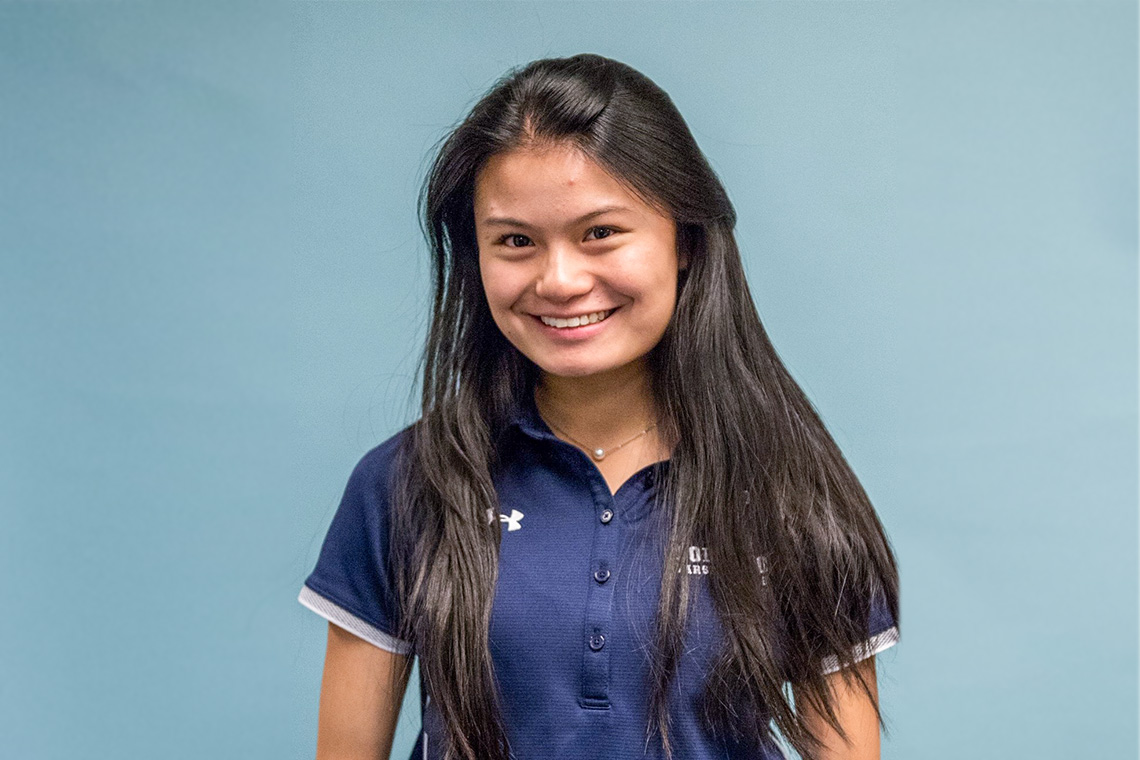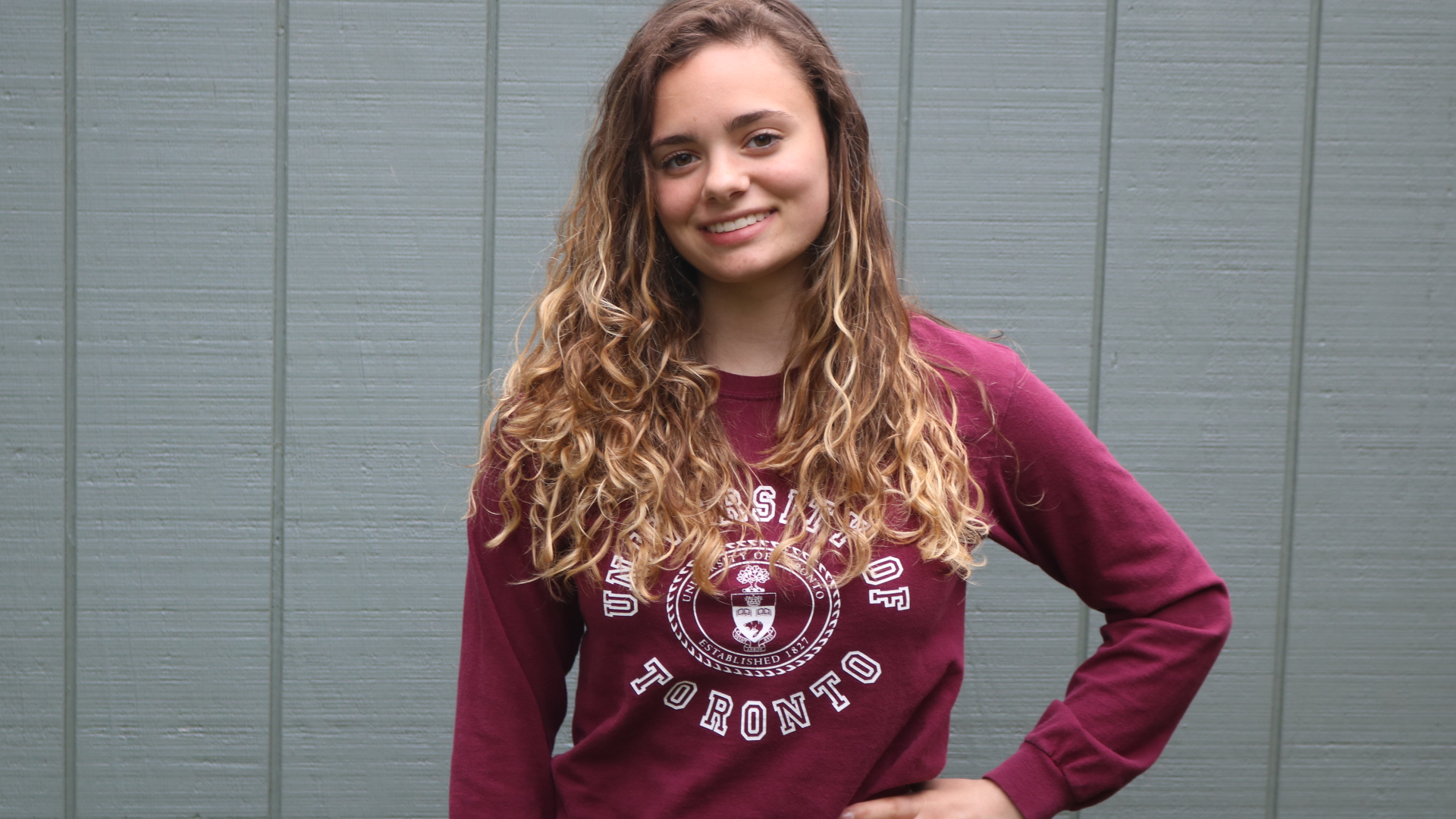COVID-19 may have necessitated the closure of university buildings, but it hasn’t stopped students from doing summer research albeit under unusual circumstances. We caught up with a few undergraduate students at the University of Toronto’s Faculty of Kinesiology and Physical Education, to find out more about their summer research projects and how the pandemic has forced them to be creative about getting it done.
“The projects are funded with research awards, providing students with outstanding research opportunities and a chance to clarify their interest in pursuing graduate studies,” says Luc Tremblay, associate professor and associate dean of research at KPE.
Sara Sutherland will be going into her third year of kinesiology in September. The Varsity Blues water polo player is the recipient of the University of Toronto Excellence Award (UTEA) in social sciences and humanities.
What is the focus of your research?
My current research, under the supervision of Associate Professor Katherine Tamminen in the Sport and Performance Psychology Lab, explores how coaches influence their athletes’ emotions and what their perceptions and experiences are with emotion regulation. We are currently in the recruiting stages of inquiry, with the goal of having 200 Canadian coaches participate in the mixed methods survey.
Why is this area of study important and who will it benefit?
This research is important because it gives insight into how coaches regulate athletes’ emotions and how these emotional fluctuations help to improve or hinder athletes' performance. These research findings will benefit athletes and coaches of all levels of competition.
How did you become interested in this area of study?
My interest in pursuing sports psychology began when I was 14 years old and started seeing my sport psychologist. She was amazing and taught me techniques, mantras and habits that helped me calm my race anxiety, improve my training and my performance. Learning these skills transferred to all aspects of my life, academic, social and professional. After taking KPE120 Introduction to Sport and Performance Psychology with Professor Tamminen in first year, I knew that this was an aspect of kinesiology that I was very passionate about and I wanted to help expose others to the power of sports psychology and positive thinking.
How has social distancing affected your research?
We are no longer able to reach out to coaches personally and our lab meetings with the Sport and Performance Psychology research team are now all conducted virtually, but Professor Tamminen has made the transition to working online fairly smooth. We are able to contact coaches via email, meet virtually to discuss scholarly articles, complete educational courses, and attend weekly meetings to update one another on how our projects are coming along.

Fiona Huang is also heading into her third year of kinesiology in September. The Varsity Blues track member is doing her summer research though the Undergraduate Research Opportunity Program.
What is the focus of your study and how did you become interested in this topic?
My project focuses on physiology, particularly in muscle damage and glucose metabolism. I got interested in this area of research because I enjoyed my second-year classes in human and exercise physiology and was intrigued by the research my supervisors, Associate Professor Marius Locke and Assistant Professor Jenna Gillen, were undertaking.
Why is that area of study important and who will it benefit?
This research is important because understanding the physiology behind glucose metabolism or muscle damage can help individuals understand the importance of exercise to a greater extent, while providing suggestions on how to prevent muscle damage and help those with metabolic diseases.
How has social distancing affected your research?
I am not able to go into the lab and receive hands-on experience with the lab techniques and methods. Additionally, data collection has come to a halt, so we have to work with data collected before social isolation and attempt to analyze it. To adjust to the circumstances without losing a step, my supervisors have provided me with assistance, guidance and direction whenever needed. For example, they have provided me with many journals and other forms of resources to gain knowledge and understanding of lab techniques. They are accommodating and caring, making this whole process more enjoyable.

Genevieve Ammendolia Tome is a third year kinesiology student, who is doing summer research with a University of Toronto Excellence Award in Natural Sciences and Engineering.
What is the focus of your study and how did you become interested in this topic?
The focus of my current research is directed towards sport-related concussions. My interest in concussions/concussion therapy stems from my personal experience with them. I sustained two concussions within 12 months of each other while playing rep volleyball. After my second concussion, I did physical therapy at a sports medicine clinic in Toronto and was overseen by a doctor specializing in concussions. The recovery period for my second concussion took much longer. I remember the doctor supervising my progress mentioning that little was known about how to detect if a concussion has occurred and if a person has recovered from one besides looking at the symptoms for reference. When I learned that U of T had a concussion program I knew that I wanted to participate in this lab so that I could learn more about the physiologic responses that occur after a concussion.
So far, I have learned about various return to play guidelines after sustaining a concussion, effective ways to enhance recovery after a concussion, such as light aerobic exercise, and certain biological markers associated with concussions.
Why is this area of study important and who will it benefit?
This area of research is very important for the understanding of concussions, how they affect us physically and psychologically, and ways we can achieve a successful recovery. Coaches, trainers, doctors and athletes of any age/level of competition will benefit from this area of research so that they can be more informed when an athlete does sustain a concussion.
How has social distancing affected your research?
It’s prevented us from going in to labs to work on the research projects. But, working from home has required me to be more independent, which is not a bad thing. My supervisor, Assistant Professor Michael Hutchison, has given me journal articles relevant to his research so that I can have a better understanding of the content. We discussed having me perform data analysis and reading current literature in certain areas of concussions to help with future research. He has been very accommodating and while I may not get the full experience of this position due to the pandemic, I believe I will still have a valuable learning/work experience this summer.

Bisman Mangat will be graduating with a degree in kinesiology this June, but she won’t be going far from the Faculty of Kinesiology and Physical Education. Come September, she’ll be starting a master’s degree in exercise science at KPE with Assistant Professor Joyce Chen in the Training and Enhancing Motor Performance Outcomes (TEMPO) lab. Until then, she’ll be working remotely on her summer research project with help from the Undergraduate Summer Research Award (USRA) from the Natural Sciences and Engineering Council of Canada.
What is the focus of your study and how did you become interested in this topic?
I am investigating the effects of priming the brain with transcranial direct current stimulation (tDCS) prior to learning a golf putting task. Transcranial direct current stimulation (tDCS) is non-invasive and painless brain stimulation that can be used to increase or decrease activity of the neurons in the brain and enhance motor learning.
I became fascinated with the brain and behaviour in my second year of kinesiology when I took an introductory course on motor learning with Assistant Professor Joyce Chen. I learned about the role that the brain plays in learning motor skills in music, for example, or sport. I also learned about the many ways this learning can be enhanced. As a former soccer player, I found the idea of targeting the brain to enhance performance very interesting.
Why is this area of research important and who will it benefit?
In today’s world, competition is greater than ever. Victory can be separated by fractions of a second and this has resulted in searches for performance enhancers and ergogenic aids to boost performance, including targeting the brain. My study will shed light on whether tDCS is one such technique that may have the potential to provide athletes with an edge in their performance.
In addition to athletes, clinical populations can also benefit from the results of this study, with preliminary evidence showing tDCS can play a role in enhancing recovery of motor function following a stroke or reducing the symptoms of depression. Finally, we all spend time trying to learn different motor skills, like riding a bike, swimming or even rock climbing, so this research can have implications and benefits for all of us.
How has social distancing affected your research?
Without access to a lab I couldn’t continue to collect data on human participants. But, in talking to my supervisor, we came up with a creative solution to work backwards on the project, by beginning to set up the statistical analysis and writing the paper – steps that are normally done after data collection is complete. We also discussed doing a secondary study in the form of a survey that could be used to emphasize the need for the primary study. The survey would focus on targeting athletes of all competition levels, as well as non-athletes, in their interest and likeliness of experimenting with performance-enhancers acting on the brain.
